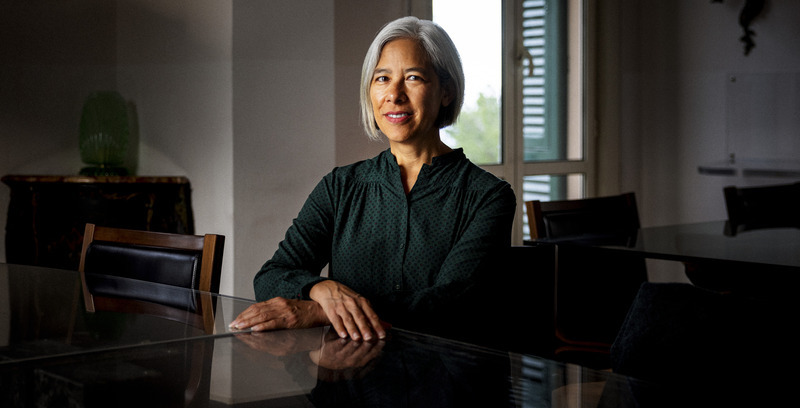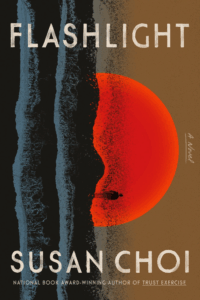
Susan Choi on Writing a Cross-Cultural Story of Mystery and Tragedy
Jane Ciabattari Talks to the Author of “Flashlight”
Susan Choi’s eerie, multi-generational transcontinental mystery saga Flashlight, her fifth novel (after the National Book Award winning Trust Exercise) evolves from a short story published in The New Yorker in August 2020. My first questions in our email exchange: How did the pandemic influence the writing of the story, and what made her decide to build it into a novel? “I wanted to write a novel about these characters from the start, I just couldn’t find a way in, which is often a problem for me,” she responded.
I had the characters, their situation, and a strong sense of their fates—for lack of a less weighty word—but part of me was afraid that the fates I’d envisioned might seem implausible to readers. I was struggling with all of this during the pandemic, as well as struggling to work in general. It seemed like anything that worked was worth trying. So although the novel I had in mind revolved around a specific, impactful event, I decided to just skip over the event completely and write about the aftermath, without even really revealing to the reader what the event was. That’s how the New Yorker story came to exist. Later on I finally wrote the events leading up to the moment we see in that story.
How did her life change as she was writing the novel? “I’m not sure how to answer. My life changed enormously, in ways that really were not connected to the novel at all. I got divorced. My father died. My children became young adults, along paths that were sometimes extremely difficult. I left the school where I’d been teaching for seven years, and where I’d also been a student, and joined the faculty at a different school that I was completely unfamiliar with. I started practicing Buddhist meditation. I stopped believing that the disintegration of our democracy was going to reverse or even slow down. My hair was already gray so that’s one thing that didn’t change. The importance of my writing to my life overall actually shrank a lot, which isn’t to say that I don’t care about my writing, just that it seems like so much smaller a part of my life now than it did when I started this book. And yet, this is the longest book I’ve ever published! Go figure.”
*
Jane Ciabattari: To what extent does “Flashlight” draw upon your own memories?
Susan Choi: The premise, of a family in Japan, draws on my experience directly, because I spent time in Japan with my family when I was a child. But what prompted the novel are less specific memories themselves than the hazy, fragmentary quality of my memories from that time, the extent to which they’re partial and distorted. My memories from that time feel like dreams, and their atmosphere is sometimes quite ominous. Eventually a storyline that departs pretty dramatically from any event of my life came along to suit that weird, ominous tone.
JC: How did you settle on the title, Flashlight?
SC: Titling a short story feels a lot less daunting to me than titling a novel, so I didn’t agonize much about titling the short story: there’s a flashlight in it, ‘flashlight’ is a nice, compact, evocative word, problem solved. Then I just never gave any further thought to a title until the novel was vastly larger than I’d ever intended it to be, full of vastly more stuff than I’d originally envisioned—but by that time, the title felt like it was in stone, whether it was appropriate or not. Now I can admit I had this fear that someone along the way, my agent or editor, might ask me to retitle the book—and I literally did not have a single other idea. Luckily it didn’t happen!
JC: You open the novel with the short story, which begins on the coast of Japan facing Korea as ten-year-old Louisa walks with her father Serk, who carries a flashlight and cannot swim. In the next scene the bright and rebellious Louisa is back in the U.S. after spending fourth grade in Japan and losing her father. Her mother Anne, who is ill, takes her to see a therapist, Dr. Brickner, who explores how her traumatic experience might influence her “bad” behaviors. (As you explain, she is “contentious by reflex.”) Was it always the plan to begin this way?
SC: There was never any plan to begin in any way. The short story in which we meet Louisa after she’s lost her father was a way that I was able to begin writing, but it wasn’t intended to be the beginning of the book—nor was there any other intended beginning of the book. I only really knew what I was interested in exploring about the characters, not the order in which I would convey information to the reader. And so the pages of this book were not, for the most part, written in the order in which they appear—and for a long time, the pages that had been the short story were relocated to somewhere in the middle. This was a book I kept shuffling and reshuffling, right up to the very end of revision.
If I start with thematic concerns, the writing almost never develops, it stays as inert as if a thousand-ton weight had been dumped on it.
JC: In the second section of the novel, you circle back to the 1940s, when Serk is living in Japan, an outsider, a child of Korean immigrants. He chooses to attend graduate school in the U.S., where he meets his American-born wife Anne. You trace their journeys for several decades, their relatives and friends, including Anne’s son Tobias, who she left with his father at birth, and who finally meets her at eighteen. How did this intricate structure evolve?
SC: I think the word ‘evolve’ is the perfect answer to this question. The book evolved in a way that was very nonlinear. I really wanted this book to be lean, allusive, perhaps even fragmentary—my inspiration was Jenny Erpenbeck’s Visitation, which could almost be called a novella. Obviously, I failed to write a novella on a pretty grand scale. Even up to late drafts, where I thought I was finished and only polishing, I would find myself adding significant new sections, like the section exploring Serk’s childhood, which was added very late. I’ve written a few novels in page order but this novel was written in circles.
JC: About a hundred pages into the novel, Anne describes her early symptoms—“losses of normal sensation and gains of ghost sensations that shouldn’t exist.” She also refers to the trip they family makes to Japan “like the so-called ‘machine of the gods,’ she’d learned about in Ancient Greek Drama. The machine in her mind, not a divine interference but a puppetlike raven the size of a house, cawing an earsplitting caw, churning up a tornado of chaos with its ungainly enormous black wings.” Her illness strikes her as “Divine retribution, another machine of the gods.” How have the themes of tragedy in various cultures influenced this novel?
SC: I try to never think in terms of themes while I’m writing—and even after the fact I often have a lot of trouble identifying themes in my work. This is why it’s so great to have readers. I almost always start with a situation, or characters—hopefully both—and from there do my best to create a plot. If I start with thematic concerns, the writing almost never develops, it stays as inert as if a thousand-ton weight had been dumped on it.
JC: You tell this story through many voices—Louisa, Serk, Anne, Tobias, Ji-Hoon. Each adds an element that fits the theme of the outsider, each has experienced tragic loss. Why build your narrative through so many characters?
It feels like a small family, even in some ways a lonely family, but a family that…gets a little less lonely as time goes on.
SC: I always knew I’d have four characters—Louisa’s family, plus this interloper she struggles to comprehend, Tobias. But I never rule out more characters, and one of the most encouraging signs, for me, that a novel might be starting to get interesting is when unplanned characters start to pop up and take over territory. That said, I still feel like this book actually doesn’t have all that many characters—it’s not Middlemarch. It feels like a small family, even in some ways a lonely family, but a family that, through the sheer force of the characters forging bonds with each other, gets a little less lonely as time goes on.
JC: Louisa recalls having a “weird dream” in which she is at the beach with her dad, when a “tower of water,” approaches, making a noise like a storm, and sucks her in. Tobias finds her childhood diary describing that dream, concluding, “Now I remember it all as if I had been there.” These pages give him an uncanny feeling, which rises from within. This sense of uncanniness permeates the novel. For instance, Tobias sends Anne a series of tapes that begin to open a door into the mystery underlying the father’s disappearance. How were you able to build it into so many scenes?
SC: The examples you’ve mentioned all came up organically while I was writing, but then they felt important, evocative and weird, and so in revision I would try to connect to them a bit more—bringing the diary pages back, finding a way to get those tapes into a tape player. It’s a mystery to me how potent details make their ways into a piece of writing; I never plan on them, but if I’m lucky I can recognize them once they’re on the page, and then do what I can to enhance them. On the flip side, plenty of details that get onto the page in early drafts don’t have that resonance, and weeding those out is part of what helps the other details become striking and, I hope, meaningful.
JC: What sort of research went into developing the relatively unknown history of North Korea?
SC: As hard as it is for outsiders to really know what’s going on in North Korea at any given moment, the history of the country is very well known, and has attracted some of the most brilliant writers living as well as some of the most courageous—people who got out and then wrote about their experience. I wish I could have read everything they have written, but if I’d even tried, I never would have written anything of my own. North Korea is an object of very close study, as it should be. It’s a harrowing example of how firmly authoritarianism can entrench itself, and with what devastating results, and the more of us who learn about it, they better off we’ll all be.
JC: What are you working on now/next?
SC: I’m working on reading all the books that have piled up all over my home while I was finishing this book—I’m binge-reading.
__________________________________

Flashlight by Susan Choi is available from Farrar, Straus and Giroux, an imprint of Macmillan.
Jane Ciabattari
Jane Ciabattari, author of the short story collection Stealing the Fire, is a former National Book Critics Circle president (and current NBCC vice president/events), and a member of the Writers Grotto. Her reviews, interviews and cultural criticism have appeared in NPR, BBC Culture, the New York Times Book Review, the Guardian, Bookforum, Paris Review, the Washington Post, Boston Globe, and the Los Angeles Times, among other publications.



















